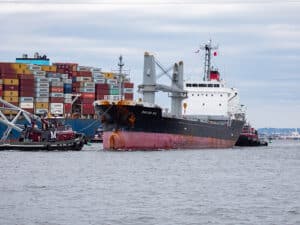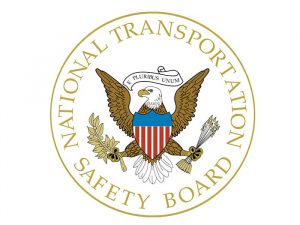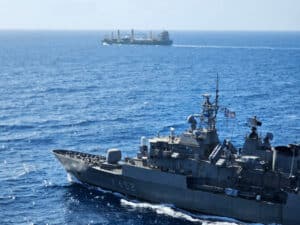
USCG orders precautions following Tianjin explosions
Written by Nick Blenkey
AUGUST 27, 2015 – Due to concerns that there may be potentially hazardous ash, debris or residues on vessels or cargo bound for U.S. ports, the USCG and Customs and Border Protection (CBP) are monitoring vessel traffic and cargo departing the port complex in Tianjin, China, following the explosions there on August 12 and 15, 2015.
A U.S. Coast Guard Marine Safety Information Bulletin issued yesterday says that representatives of impacted vessels (including those carrying cargo that was in Tianjin) should be prepared to demonstrate to the relevantUSCG Captain of the Port (COTP) and to Customs and Border Protection (CBP) authorities the actions that have been taken to ensure that no hazardous conditions exist onboard their vessels or with their cargo as a result of the explosions.
Any suspected hazardous conditions, illnesses or unknown substances or residues should be reported to the nearest COTP as soon as possible in accordance with 33 C.F.R § 160.216.
The COTP has the authority to deny a vessel entry into a U.S. port or direct vessel movement to a safe location should the COTP determine that the vessel poses an unacceptable risk to the safety of the port or the environment.
The COTP will work with all affected industry stakeholders to ensure a response commensurate with the risk, which takes into account all appropriate safety concerns while aiming to minimize any shipping delays.
COTPs will evaluate each vessel individually for risk factors when determining appropriate courses of action. Vessel owners and operators of impacted vessels bound for U.S. ports should assess the following criteria for their vessel or cargo and determine if COTP notification is warranted. Among factors COTPs will consider when determining whether the vessel or cargo may constitute a risk to the port are:
- The location of the vessel or cargo within the port of Tianjin during the time window of concern;
- The operations that were ongoing, such as loading or discharging of cargo;
- Whether or not any cargo bays, holds, or external doors were open;
- The status of the cargo or containers held within cargo bays or holds within the time window of concern;
- Whether the vessel received any visible ash, debris or residue on deck, within ventilation, in between containers, or on any other part of the ship following the explosions;
- Whether any persons onboard have been experiencing any ill health effects subsequent to the explosions for unknown reasons, or due to exposure to substances from the explosions;
- Whether an impacted vessel has undertaken measures to test for potentially hazardous substances including any sampling taken; and
- Weather conditions experienced en-route.
Download the MSIB HERE





Leave a Reply
You must be logged in to post a comment.